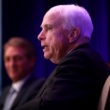Family Values—The admission by Senator David Vitter (R-LA) that he was involved with someone in the employ of Washington madam Deborah Jeane Palfrey is the second linking of Vitter’s name to a prostitute. In his 2004 Senate campaign, Vitter, a Christian conservative, had to fight off allegations he was involved with a New Orleans prostitute, a story that has resurfaced, as the proprietor of the French Quarter brothel told a TV reporter that Vitter was her client in the late ’90s.
Vitter is no stranger to legislative prostitution. He appeared to be doing the heavy lifting for disgraced (and felonious) D.C. lobbyist Jack Abramoff when as a member of the House in 2002 Vitter persuaded twenty-seven of his colleagues to sign on to a letter he wrote to Interior Secretary Gale Norton urging her to deny Louisiana Choctaw Indians a gaming license. Everyone who signed that letter received a contribution from Abramoff, who had been hired by the Coushatta tribe to block other tribes’ casino permits in Louisiana.
When the Abramoff scandal broke in 2004, House members who’d signed Vitter’s letter pointed the finger of suspicion at him. Vitter had received campaign contributions from Abramoff, who billed Indian tribes more than $80 million, much of it fraudulent. But Vitter’s $6,000 payment from Abramoff didn’t put him in the same league as others such as former House Speaker Denny Hastert, who took $100,000. Vitter did, however, benefit from a fundraiser held at Abramoff’s upscale Pennsylvania Avenue restaurant. And a Christian front group funded by Abramoff’s Indian gaming money and run by former Christian Coalition director Ralph Reed provided phone banks and mass mailings for Vitter when he ran for the U.S. House. As a U.S. senator, Vitter was one of the Republicans Senator John McCain (R-AZ) allowed to walk at the end of McCain’s two-year investigation into Abramoff’s $80 million shakedown of Indian tribes.
At an Indian Affairs Committee hearing in July 2005, McCain went out of his way to defend Vitter, undermining the testimony of one of his lead witnesses, Choctaw Band Chief Christine Norris. “The committee has seen absolutely no evidence that Senator Vitter’s proposition had to do with anything other than his long-standing opposition to gambling,” said then-committee chair McCain. Before allowing Norris to testify, McCain warned her about “casting aspersions on Vitter.” It was one of several times the Straight Talk Express got sidetracked, considering that the inquiry never got around to investigating powerful Republicans such as Reed and Grover Norquist. Louisiana is forgiving of the peccadilloes of its politicians. But Vitter has always run as an upstanding Christian conservative. His whoring and hypocrisy will encourage the Democrats to recruit and fund a strong opponent when he has to run again in 2010.
McCain’s Meltdown—The vertical collapse of John McCain’s presidential campaign leaves former Bush backers in Texas adrift, most notably Mark McKinnon, the onetime Democratic Party media strategist, who says he looked across the room one night in 1998 and realized that Bush was his guy. McKinnon had a similar reaction to McCain, with one caveat: he said he couldn’t support McCain in a McCain-Obama presidential race. It looks as if that’s not a decision McKinnon will have to make. Defining himself as the inheritor and defender of Bush’s war in Iraq, McCain has watched his poll numbers fall to 10 percent from 25 percent in Iowa and from 27 percent to 12 percent in Florida. In South Carolina, where a Karl Rove smear campaign ended McCain’s last presidential run in 2000, McCain’s support has fallen to 17 from 43 percent. He’s cut staff and trimmed spending, but his campaign could be over.
Single Digits?—With McCain faltering, the question arises, will Dick Cheney’s poll numbers drop below 10 percent? The Vice President’s support stood at 13 percent in a recent CBS poll. Cheney peaked in the summer of 2002 with a 56 percent approval rating. It’s been all downhill since then.
In early July, top-level White House staff met to discuss the eroding support among Congressional Republicans—particularly in the Senate—for the president’s Iraq policy. Attending the meeting were Senior White House Advisor Karl Rove, Chief of Staff Josh Bolten, Defense Secretary Bob Gates, Secretary of State Condoleezza Rice, National Security Advisor Stephen Hadley and White House counselor Ed Gillespie. Cheney was not at the meeting. Days later he met with Senate Republicans in an attempt to halt further defections. Shortly thereafter, seven Republicans voted for a proposal by Senator Jim Webb (D-VA) to cut the length of deployments for American troops in Iraq.





0 Comments